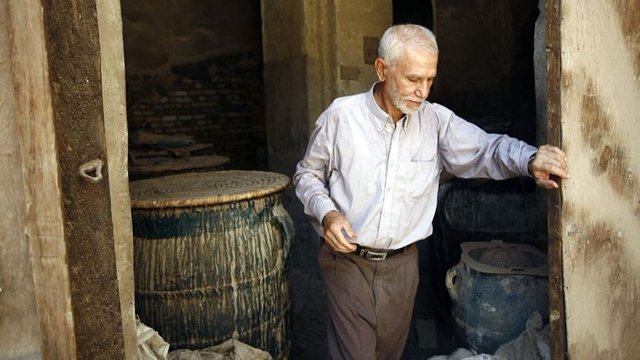The Iraqi Jewish Archive is stolen property that should go back to its original owners
By Carole Basri and David Dangoor,

In the preamble to the 1954 Hague Convention for the Protection of Cultural Property in the Event of Armed Conflict, it says that “damage to cultural property belonging to any people whatsoever means damage to the cultural heritage of all mankind, since each people makes its contribution to the culture of the world.”
Nevertheless, the cultural property of many indigenous peoples of the Middle East is in grave danger, and the West is actively participating in the permanent theft and loss of this property from its original, legal owners. The most notable example of this is the Iraqi Jewish Archive, a collection of books and rare documents that a U.S. Army team found in the basement of Saddam Hussein’s intelligence headquarters in May 2003. Though these items had been forcibly confiscated by Iraqi authorities from the more than 150,000 Jews who fled the country during the previous century, the United States will return them to Iraq.
This issue is not just a Jewish one. Many other indigenous groups are being disenfranchised and forced to flee from parts of the Middle East — the Yazidis, the Kurds, Coptic Christians, Sunnis and Shias. Like the Jews, they are losing not just their homes and communities but also their communal treasures, personal assets and, by extension, their history.
The Iraqi Jewish Archive, a testament to a 2,600-year-old community, was in poor condition from neglect when it came to the United States to be preserved, catalogued and digitized. It has been on exhibit in a number of cities for several years. If it returns to Iraq, its original, legal owners will never be able to see it.
At the beginning of the last century, almost 1 million Jews lived in the Middle East and North Africa. Living in what is today known as the “Arab world,” these Jews had preceded Islam and the Arab presence in much of the region by around a millennium. This all came to an end during the middle and latter part of the last century when these indigenous communities were forcibly expelled en masse, leaving few Jews remaining in the Middle East, outside of Israel.
More than 2,700 Jewish books and tens of thousands of documents, records and religious artifacts are part of the archive of personal and communal property left behind by those who fled Iraq. Against the objections of the Iraqi Jewish Diaspora, the U.S. government is preparing to ship the archive back in September 2018, based on an August 2003 agreement between the Coalition Provisional Authority and the National Archives and Records Administration and extended by the U.S. government in an executive order signed by President Obama.
This cultural appropriation is taking place because of the Emergency Protection for Iraqi Cultural Antiquities Act of 2004, as amended effective April 30, 2008. Similarly, memorandums of understanding have been signed and enacted as recently as February 2018 for Syria, Egypt and Libya, where Jewish property, history and assets are being appropriated and stolen.
In Yemen, where Jews long have lived in second-class status with the threat of death by senior officials, all but a few Jews have fled the country. Some who fled grabbed what they could, such as religious possessions, but even these ultimately could be returned to Yemen.
On Jan. 31, 2018, the International Council of Museums released a Red List for Yemen that directly targets Hebrew manuscripts and Torah finials. The Red List notes, “Yemeni authorities will ask for the retrieval and the repatriation” of these items. Frequently, issuing a Red List is the first step in a process to hold public hearings and ultimately pass memorandums of understanding between the United States and foreign governments that blockade art and cultural property, denying U.S. citizens the rights to their historic heritage.
With regard to Iraq, Syria, Egypt, Libya and Yemen, no such decisions, laws or memorandums of understanding should be made with states where Jews were subjected to ethnic cleansing and state-sanctioned anti-Semitism. In Iraq, Nuremberg-like laws led to ethnic cleansing.
The United States can stop aiding and abetting the theft of property, assets and culture. The Iraqi Jewish Archive should return to the private and communal Iraqi Jewish owners, who were not consulted on the expropriation of their property or the agreement to return the property to Iraq.
Additionally, the United States should reverse its policies on the return of personal and communal Jewish assets to countries where Jews are not welcome. Before it is too late, Washington should stop the signing of a memorandum of understanding with the government of Yemen. This is not only a matter of law; it is above all, a matter of justice.
Carole Basri is a lawyer of Iraqi Jewish descent, an adjunct professor at Fordham Law School and visiting professor at Peking University School of Transnational Law. She is a former member of the U.S. State Department’s Future of Iraq Project, and was a member of the Coalition Provisional Authority working with the Iraqi Reconstruction Development Council (IRDC) from July 2003 to July 2004.
David Dangoor is vice president of the World Organization of Jews from Iraq (WOJI) and honorary president of the Association of Jewish Academics from Iraq.
[ original here ]
Category: Heritage, Iraq, Justice for Jews of Arab Countries, Literature



